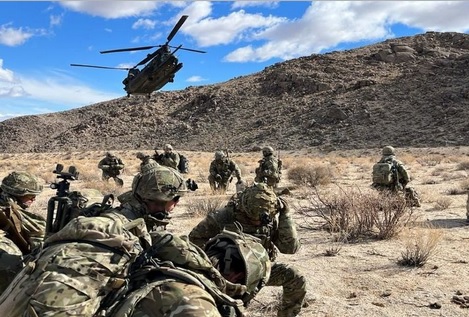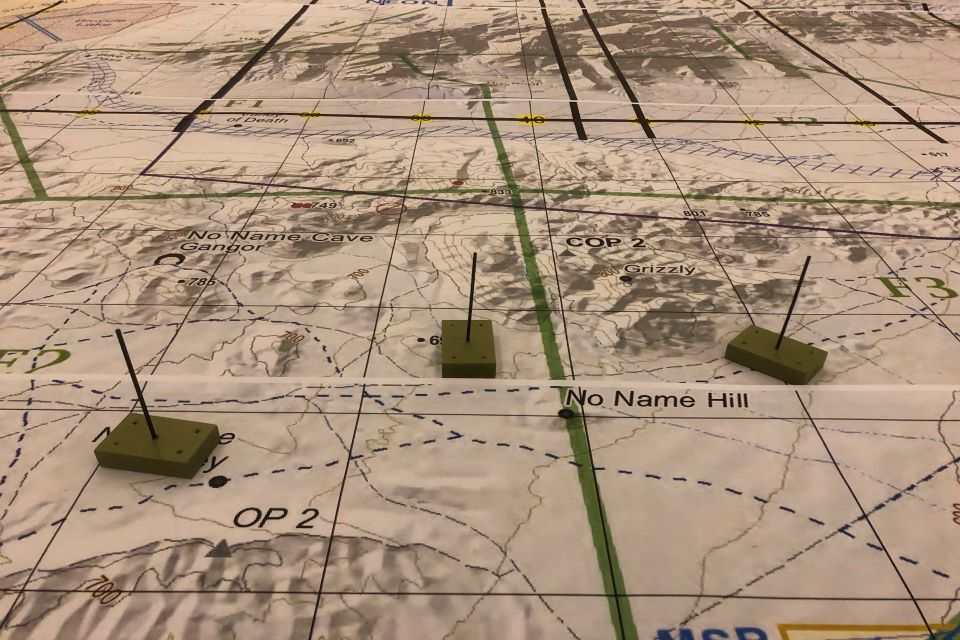UK scientists support British Army in US experiment

Above:
Service personnel in a desert environment with a Boeing CH-47 Chinook helicopter flying overhead.
Courtesy Dstl
Project Convergence 2022 (PC22) has involved several thousand US, UK and Australian members of the Armed Forces, including around 500 British Army personnel. It is the premier US Army experimentation exercise and seeks to define how the US and international partners, including the UK and Australia, will fight in a multi-domain battlespace. Convergence is about multinational military benefit from the power of equipment and software combinations.
More than 25 scientists and engineers from Dstl were deployed to Fort Irwin, California during October and November as part of the project.
Dstl worked closely with the UK’s 20th Armoured Combat Battle Team (20 ABCT) and 2nd Battalion, The Yorkshire Regiment (2 YORKS) in delivering the UK component of PC22, through a series of battlegroup and platoon level activities. These activities are part of the PC22 combined joint interoperable experiment involving the American 1st Cavalry Division.
The experiment is designed to help make the British Army more effective on the battlefield, by cutting down on time and complications in the ‘sensor-decide effector’ chain by testing a number of cutting-edge systems and technologies, including some for the first time. This was achieved by explicit investigation of the Sensor-Decider-Effector (SDE) chain, and by experimenting with discrete aspects of the chain, such as image processing, deception or use of remote and autonomous systems.
Science and research is vital to overcome challenges and to see where successes and operational advantage can be gained for future war fighting.

Multiple UK objectives were achieved using UK systems and experimentation including:
HYDRA-R: UK/US Artificial Intelligence Toolbox deployed, tested and trained to detect, recognise and identify enemy vehicles using UK and US surveillance video. HYDRA-R was the first live deployment of the UK/US Artificial Intelligence (AI) Toolbox, a jointly developed AI pipeline for selection, deployment and retraining of AI models in mission. AI experts from the UK and US sat shoulder to shoulder in the middle of the trial, training and deploying AI models against data collected by UK and US platforms. This was the first step towards deploying collaborative AI and autonomy in future Project Convergence trials.
Cyber and Electro-Magnetic Activities (CEMA) Experimentation: successful use of an electronic warfare (EW) deception capability at scale and within a Combined Joint force.
Remote and Autonomous Systems (RAS) Platoon: created a ‘network of things’ through autonomous systems integrated at the sub-tactical level through the US’s research project (Pj SHARE). Uncrewed air and ground platforms were deployed and displayed on single soldier-borne devices which simultaneously showed real time information on UK and US dismounted forces.
Sensor-Decider-Effector: To investigate the delivery of ‘any sensor, right decider and best effector’ by integrating a vertical slice (theatre to sub-tactical) of networked capability as part of a Joint and Combined (multinational) force. This was demonstrated successfully across a multinational formation, with one nation’s deciders able to engage targets which had been observed by other nations’ sensors.
Expeditionary Combat Service Support: the mix of process, technology, organisation and information that offers the best advantage to maintainers supporting repair in the forward echelons was successfully investigated.
UK Rangers: support successfully given to UK Rangers in the development and a testing of their concepts of employment and operations. The Ranger Regiment are Army Special Operations force integrated with US special operations forces (SOF) partners in deep battlespace, to enable defeat of enemy forces, disrupt command and control (C2) nodes and enable conventional manoeuvre.
Dstl scientists worked with UK Army Headquarters’ Future Force Directorate (FFD), and have been instrumental in developing the data capture and analysis (DC&A) plan for PC22. Over several months, Dstl has worked with US counterparts, notably the Research and Analysis Center, White Sands Missile Range (TRAC-WSMR), to develop testing and observation methods. Dstl is an integral part of the Joint Interoperable Data Analysis Cell (JIDAC) which reported daily on experiment progress and will be preparing the final experiment reports.
This collaboration obtained 3-star endorsement and direction. Collaboration at experimental and operation levels with the US and other allies is considered essential in delivering future warfighting capability. The future battlefield will demand seamless interoperability between systems from different nations. It is only through experimentation with systems interoperability at scale that capability development and military effectiveness can be progressed.













